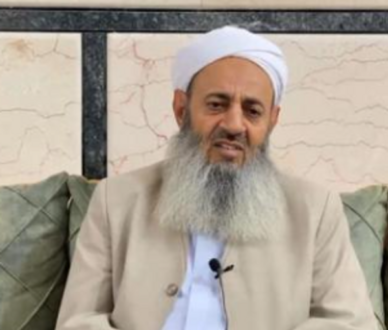Iranwire – Iran’s most prominent Sunni cleric has said that the country should be controlled by politicians, not the armed forces, as he reiterated his call for all those jailed during the recent unrest to be released.
Molavi Abdolhamid, the Friday prayer leader of the southeastern city of Zahedan, made the comments on February 10 amid more protest rallies in the restive city.
Despite increased security measures, large crowds took to the streets, chanting slogans such as “Death to the dictator” and “Khamenei is a murderer,” in reference to Supreme Leader Ali Khamenei.
🎥 ویدیوهای منتشر شده از #زاهدان، حاکی از حضور پرشمار معترضان است. ۲۱بهمن#اعتصابات_سراسری #مهسا_امینی #اعتراضات_سراسری #شهروندخبرنگار pic.twitter.com/y9lKDnCfVh— ایران وایر (@iranwire) February 10, 2023
🎥 «زندانی سیاسی آزاد باید گردد»؛ شعار معترضان در #زاهدان. ۲۱بهمن #اعتصابات_سراسری #مهسا_امینی #اعتراضات_سراسری #شهروندخبرنگار pic.twitter.com/CB4iqhrfej— ایران وایر (@iranwire) February 10, 2023
“Iran is in the hands of the military forces now. Many officials are from the military. We love the military, but their job is different,” Molavi said in his Friday prayer sermon.
“The country should be in the hands of politicians. Those who have compassion and expertise should be in charge,” he added.
Molavi has been a key dissenting voice inside the country since the eruption of the ongoing anti-government demonstrations triggered by the September death of a 22-year-old Kurdish woman, Mahsa Amini, in the custody of Tehran’s morality police.
He has repeatedly denounced the deadly crackdown on the women-led protest movement and urged Iran’s Shia clerical leaders to listen to the Iranian people instead of repressing them.
Activists say security forces have killed more than 520 people and detained over 18,000 in connection with the demonstrations, which pose one of the most serious challenges to the theocracy installed by the 1979 Islamic Revolution. Following biased trials, the judiciary handed down stiff sentences, including the death penalty, to protesters.
The demonstrations and clampdown on dissent have been particularly intense in the country’s western Kurdish areas and Sistan and Baluchistan province, home to Iran’s beleaguered Sunni Baluch community.
🎥 امروز ۲۱بهمن، حامیان مولوی عبدالمجید مرادزهی در #خاش به خیابان آمدند.#اعتصابات_سراسری #مهسا_امینی #اعتراضات_سراسری #شهروندخبرنگار pic.twitter.com/8Jcn7YOB88— ایران وایر (@iranwire) February 10, 2023
Residents of Zahedan, the capital of Sistan and Baluchistan, have been holding protest rallies every Friday since September 30, when security forces killed nearly 100 people in the deadliest incident so far in the widespread demonstrations.
“The nation is in trouble and is going through a crisis. Iranians are disappointed because they know that their problems won’t be solved, and that’s why they are protesting,” Molavi said on February 10.
“People demand the release of all political prisoners who have been arrested in recent protests. The government has released some of them, and this is a positive step. All the prisoners and all the detainees of the recent protests should be released,” he continued.
The cleric also called for an end to “widespread discrimination and inequality.”
“Women have been discriminated against and are second-class citizens. Sunnis are not even second-class citizens, they are third-class citizens. We haven’t had any [Sunni] minister or governor,” he said.
 Shabtabnews In this dark night, I have lost my way – Arise from a corner, oh you the star of guidance.
Shabtabnews In this dark night, I have lost my way – Arise from a corner, oh you the star of guidance.



